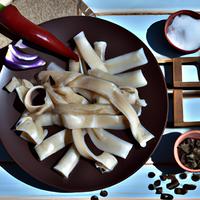
1 serving (50 grams) contains 38 calories, 8.0 grams of protein, 0.8 grams of fat, and 0.0 grams of carbohydrates.

Log this food in SnapCalorie

Nutrition Information
Calories |
177.4 | ||
|---|---|---|---|
% Daily Value* |
|||
| Total Fat | 3.5 g | 4% | |
| Saturated Fat | 1.2 g | 6% | |
| Polyunsaturated Fat | 0 g | ||
| Cholesterol | 473.2 mg | 157% | |
| Sodium | 2839.1 mg | 123% | |
| Total Carbohydrates | 0 g | 0% | |
| Dietary Fiber | 0 g | 0% | |
| Sugars | 0 g | ||
| protein | 37.9 g | 75% | |
| Vitamin D | 0 mcg | 0% | |
| Calcium | 71.0 mg | 5% | |
| Iron | 1.2 mg | 6% | |
| Potassium | 709.8 mg | 15% | |
* Percent Daily Values are based on a 2,000 calorie diet. Your daily values may be higher or lower depending on your calorie needs.
Food Attributes
Source of Calories
About Salted squid
Salted squid is a seafood delicacy commonly found in East Asian and Mediterranean cuisines. Made by curing fresh squid with salt, this preservation method enhances its savory, umami flavor and extends its shelf life. Rich in protein, salted squid supports muscle maintenance and offers essential nutrients like vitamin B-12, selenium, and phosphorus, which promote energy metabolism, immune health, and bone strength. However, it is typically high in sodium, which may not be suitable for individuals with hypertension or those on low-sodium diets. Its chewy texture makes it a versatile ingredient, frequently used in stir-fried dishes, salads, or as an appetizer. While not a significant source of fat or carbohydrates, salted squid delivers flavorful nourishment with mindful consumption. Always rinse or soak before cooking to moderate its salt content and balance its inclusion in a nutritious diet.



